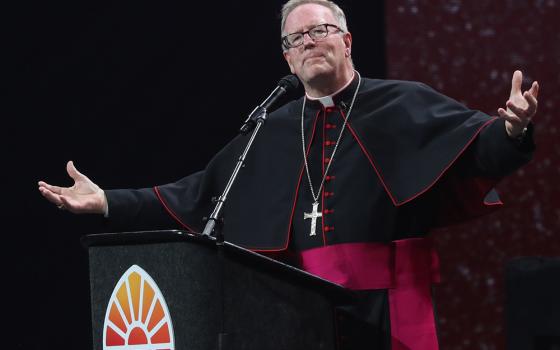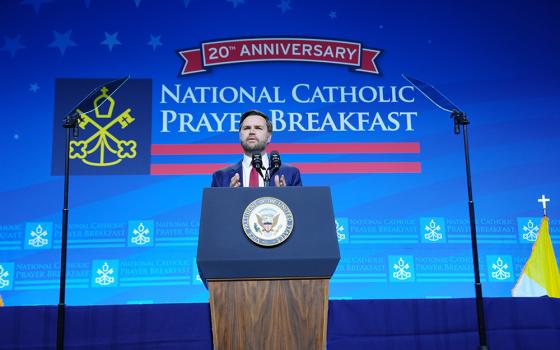
Christian Ruehling shares a laugh with a Salesian sister.
Service to others has always been a hallmark of the church's mission, and is a tradition that merits serious consideration. There are, however, several important factors to consider before one decides to volunteer a significant part of his or her life, especially since those who do make the commitment are often young and just beginning to make the decisions that will impact the rest of their lives. So what questions should one ask oneself when contemplating the decision?
NCR spoke to several people who have made the decision to spend time in service to find out questions others considering a year of volunteering should keep in mind.
1. Can I afford it?
The question of affordability is the first many prospective volunteers ask themselves, but the good news is that there are a variety of ways to make a volunteer experience affordable.
"Several people who are considering service are college students who are getting ready to graduate," said Katie Mulembe, director of operations for Catholic Volunteer Network, "so they need to consider issues like student loans and family obligations."
While some students face anxiety when contemplating service for this reason, many resources exist to help prospective volunteers make service a financially viable option.
"Many of our programs offer housing, a stipend, sometimes there's shared transportation to the work site from where you're living. … People coming right out of college might think, 'I can't afford to serve because I have all these loans to pay off.' But a lot of times, programs can work with you for loan deferment, or find other opportunities to make service possible," Mulembe said.
Some programs, including AmeriCorps, also provide education rewards for qualifying students, money that can be used to pay existing loans or to fund graduate studies after completing their service.
2. How will it impact my life in the short term?
Watching peers go into high-paying jobs and explaining to family the motivation can be tough. Once in their chosen programs, volunteers often find that their living situation is quite simple — possibly even less glorious than the relatively unornate lifestyle they were expecting.
"A person should ask themselves are they prepared to handle any pushback or criticism with this decision [to serve]," said Maria Beben, who spent a year in Franciscan Mission Service in Washington, D.C., primarily working as a staff writer in the mission's office.

Kerry DiNardo in front of the words describing what traits her fellow community members see in her
Others may "have the mindset that this is taking a year off, or setting yourself back — 'Why aren't you getting a real job?' Things like that. People don't understand why you would choose to spend a year not making that much money," Beben said. "Be prepared to explain to people it's not a waste of time; it's a great life experience."
"I think the most important thing to consider when deciding to volunteer is that you are challenging yourself to leave your comfort zone, whether that be with your family, your job, your friends, university, etc.," said Christian Ruehling, who took a break from a successful career to spend six months volunteering, first in Ethiopia and then Geneva with VIDES+USA, a program of the Salesian sisters.
"One has to feel ready to be disconnected from all that one is used to having close by, because once you leave for service, you will find yourself disconnected, as you will have a new focus and that is serving the people whom you have decided to be a part of," Ruehling added. "This is especially true when leaving for a far-off land that is many time zones away. It may not be your intention to be disconnected from home, but it can't be helped, so it is important to be ready for that."
Beben also said that living in the tight community of a volunteer network presents challenges worth thinking about.
"If someone is the type of person who doesn't want to make a lot of time commitments in the community, it could be tough," she said. "It was one of the most challenging aspects of my year, but it was also one of the most rewarding aspects."
While a volunteer experience is nearly always rewarding, prospective volunteers should not expect it to be easy, comfortable or familiar.
Advertisement
3. Where do I want to go, and for how long?
Service options range from local community engagement to work in developing nations; volunteer opportunities can be found almost anywhere in the world.
"Some people want to go abroad and serve in a foreign country; some stay closer to home or want to try out what it's like living in a different state," said Faith Yusko, a recruitment associate for Catholic Volunteer Network. "How long to serve is also a big consideration."
Yusko noted that most prospective volunteers are recent college graduates hoping to spend a year in service, but volunteer programs can be found to fit anyone's needs.
"We also have alternative break options, summer programs, and [up to] three years of consecutive service, depending on the site," she said.
The experience of volunteers proves she is correct: Kerry DiNardo, a former volunteer at Cristo Rey Boston High School, said that she "wanted to get out of Philadelphia" for a time, which motivated her to go to Boston, while Beben's service was practically across the street from the Catholic University of America, which she attended. Ruehling left his job in New York for Ethiopia.
DiNardo also opted to extend her service at the high school after her initial year ended, and stayed on for a second year; Ruehling initially committed only to six months of service in Ethiopia, before finding another six-month opportunity in Geneva.
"It's okay to not know what's next, and have an open mind and an open heart. ... There's no limit to where you can go after service."
-- Faith Yusko
4. How do I choose a program?
Answering this question requires wrestling with a related question: Why do I feel the call to serve?
"Diving deep into that — what am I hearing in this call to serve, why do I want to serve in this capacity — will really deepen your commitment to the process, and also help you find exactly what you're looking for," said Yusko.
Different jobs require different skills, and some are more suitable to certain jobs than others. Not everyone will thrive in a school setting; others will struggle in a nursing home.
"It's important to look at the internal versus external motivation," said Beben. "If someone is wanting to do service for a résumé boost, or because they think it looks good, it's going to be a tough year for them, because there's going to be a lot of challenges that are going to be hard if you're not internally motivated."
Mulembe recommends that prospective volunteers "take a little time to reflect on where this interest came from, what inspired it and how they envision themselves serving, and move according to their primary drive."

Maria Beben at the Little Sisters of the Poor residence in Washington, D.C.
DiNardo stressed the importance of meeting with the directors of the programs she was considering, as well as speaking with some who were already in the programs. Volunteer organizations are also usually quite willing to guide someone through the discernment process and provide resources to help, like Catholic Volunteer Network's Response directory, which lists all the network's opportunities.
"There are so many different opportunities out there, it's easy to just go to the first one you've heard of," Yusko said. However, she stressed that there are so many programs because there are so many people with different talents and skills who can contribute, and that ultimately it is worth searching for a program that fits each individual.
5. What do I do when it's over?
Service may not place one on a career path, but valuable experiences and skills are gained that can carry over into professional opportunities.
Many volunteers find that their service in health care opens the door for a career in medicine. Others who spend their time in service working for the voiceless and marginalized may learn skills useful in community organizing or in the law.
Beben has found that her time writing and managing social media for Franciscan Mission Service has helped her in her current role, where she edits her company's webpage and manages its online presence.
"It's okay to not know what's next, and have an open mind and an open heart," Yusko said, "but if you have a certain game plan for yourself, service can only enrich that. … People go on to get law degrees, become a teacher, or a happy spouse or join a religious vocation. There's no limit to where you can go after service."
[James Dearie an NCR Bertelsen intern.]








